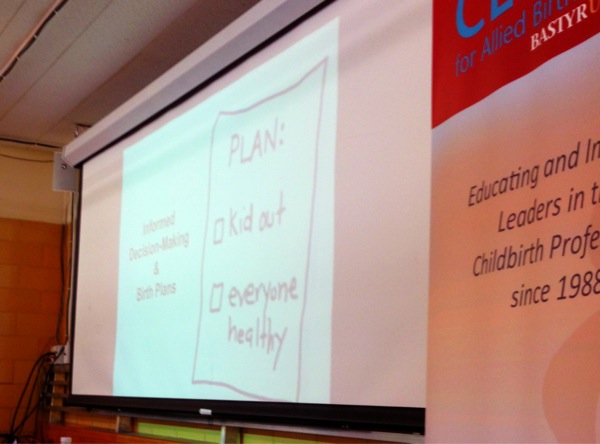An education
 Monday, May 6, 2013 at 2:40PM
Monday, May 6, 2013 at 2:40PM 
Taking a childbirth educator training is not something I would have done of my own volition anytime soon (and perhaps this is my mothers' day post, since we both know I won't get around to writing again before Sunday), priorities being what they are; self worth (frankly) being what it is. My interests and value, monetarily speaking at least, have been on the back burner which, on our 30 year old stove, means the non-functioning burner where we keep the compost bowl (true story). My value lies in being home both because I have few marketable skills and because I am an educated and intentional mother. So, to be a nice guy, Nathan signed me up for a class. It was not a cheap class, nor was it, in actuality, the workshoppy pastime for idle stay at home moms I envisioned (because, real talk, I have devalued my own interests and motherhood-related intellectual pursuits as passing, hormone-driven whims. Do you do that too? Because stop; it is total bullshit!).
It was rigorous and in-depth and involved many, many, many hours of online coursework before the three in-person days spent at Bastyr University's Simkin Center in a classroom just like real people learning things in an official capacity (read: students). It was facilitated and taught by people who, had they looked hard enough, might've seen the cartoon hearts dotting the path straight toward them from my eyeballs. It was unadulterated birth junkie heaven, yes, but it was also intellectual. Scholarly. It was revitalizing and legitimizing to be in a roomful of current and future professional women all interested in the empowerment of pregnant people, and the healthy growth of new families. I sat next to midwives and naturopathic doctors and doulas and other mothers and did the same assignments, dove head first through the same hoops, and I can say without hesitation something I never would've guessed before arriving in that classroom: the floor beneath those hoops was the same distance away for all of us.
Prior to the in-person portion of the class, I fretted pretty much constantly about everyone else's expertise as it related to my own (or lack thereof). Reading their forum responses to our readings, I was drawn to the credentials that I don't doubt were dropped on purpose to assuage their own self-doubt, because, as I learned, our guts were all teeming with butterflies. But in discussion I quickly realized that the field was level: future midwives who had not, themselves, yet given birth worried about their lack of experience. Women who'd had one baby pointed out that they hadn't had two. Older women had trouble with technology and pregnant ones lamented the fog that settled in their minds, making them lose their train of thought. Most everyone dreaded the practice teaching we obviously had to do. When I worried about how I'd be received, as I now know others did too, I neglected (as did everyone else) to remember that we were all taking a class whose main purpose was to imbue us with the ability to be unconditionally supportive. Predictably (in retrospect), there was no (or very little) competition; there was only admiration, constructive feedback, and a lot of over-sharing.
I thought I would leave the training further determined to teach natural-focused childbirth classes to those who are traditionally excluded from participation in them. Teenagers, poor families, those whose cultures hold the medical model of care and allopathic physicians as superior, godlike. My vision of that was flawed in many ways but the most flagrant flaw was that I would have presented my own steep bias. During my own childbirth class I closed my ears to the information on cesarean birth because I thought doing so would ensure my "perfect" outcome. Willfull ignorance is never okay, and is not a state I prefer. Still, unchecked, I may have imposed that on others, which would've been a disservice of such ridiculous proportion I can hardly stand to think about it.
My vision has changed, obviously, partly because my belief in "the facts" has solidified (for a good read on this, see Dr. Claire Wendland's article called The Vanishing Mother which totally blew my mind). I don't need to dance around the reasons for, for example, elective induction because I believe in the data that says it's a bad practice; I believe in people's concern for their babies, and in their ability to understand the data. And, as I realized while listening to Kim James, doula, educator, and fancy lady, I believe so strongly in these things that it doesn't matter if pregnant people make a different choice than I would. As long as I'm giving them all the facts I can move on with confidence that I haven't shortchanged them with a lie of omission, or myself by letting my belief in nature, support, knowledge and women waver by failing to present every side.
I don't know how long it'll take me to collect the baby dolls and pelvises and posters I need or to develop a curriculum, but I'm excited. As one of my classmates and fellow at-home mamas said in our closing circle (because it is hippie Bastyr in the hippie PNW), it was nice to realize that I still have valuable skills. I'm in a nice position, since you can't make less than nothing, and that is what I earn right now. I could, theoretically, offer workshops for free or very cheap. I can, in the immortal words, go my own way, easily and without much risk. I can, and plan to, take my time gathering resources, observing others, and continuing my education, because even though I feel fairly good about the content, my delivery needs quite a bit of practice and refinement.
Finally, I'm glad that my kids saw me doing something that had nothing to do with them, and in which I was clearly emotionally and intellectually invested. I have no problem with motherhood as an occupation, and the fight over its legitimacy and importance is a hill I would more than willingly die on, but until the kids stop needing me so much, I'll think of this as my night job. My other night job, I guess. I hope that's your takeaway from this long story of my long weekend: motherhood is fucking legitimate, whether you're doing it, and only it, full time, or teaching others how to follow the path of their intuition and bodies to the moment it becomes manifest in their arms. Neither is frivolous, neither is easy, and for some reason I am still learning that. Happy Mothers' Day, mamas.
 stefanie |
stefanie |  2 Comments |
2 Comments |  adult education,
adult education,  bastyr,
bastyr,  childbirth,
childbirth,  childbirth education,
childbirth education,  education,
education,  school,
school,  simkin center in
simkin center in  birthy
birthy 


